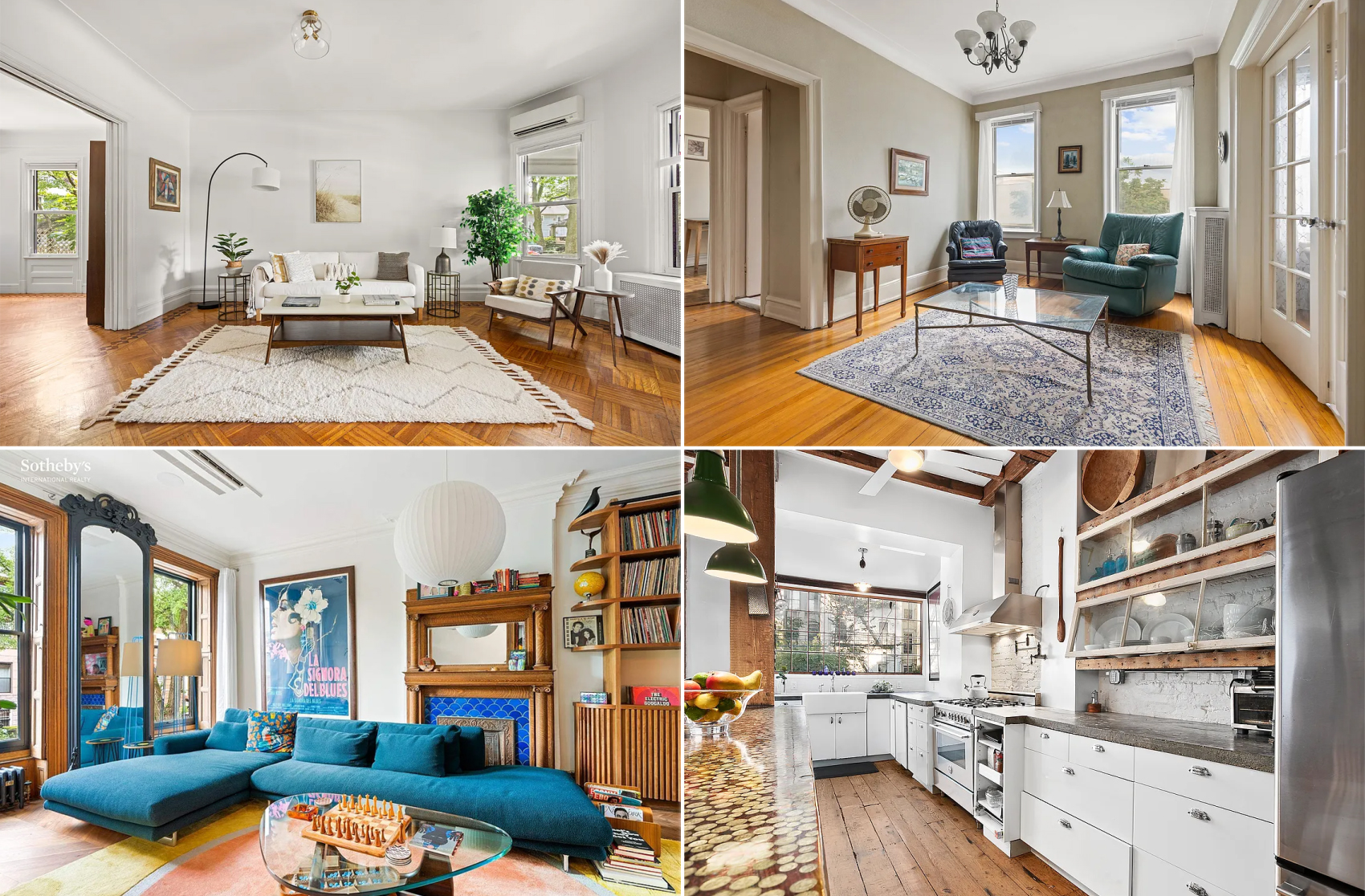Corcoran '07 Market Report: Brooklyn's Still Up
The Corcoran Group released its year-end market data today, and the brokerage’s stats show the ’07 Brooklyn market making healthy (if not huge) gains over 2006. The median sales price on all condos and co-ops was up 7 percent last year, to $590,000, while median townhouse values rose 2 percent in ’07, to $1.2 million….

 The Corcoran Group released its year-end market data today, and the brokerage’s stats show the ’07 Brooklyn market making healthy (if not huge) gains over 2006. The median sales price on all condos and co-ops was up 7 percent last year, to $590,000, while median townhouse values rose 2 percent in ’07, to $1.2 million. The really fun part of the report, however, is its breakdown of how various neighborhoods have fared, sales- and price-wise (see chart on jump). The big winner? Brooklyn Heights, where the median price shot up 19 percent, to $1.3 million. Cobble Hill/Carroll Gardens, on the other hand, showed a median price decrease of 9 percent, going from $950,000 in 2006 to $860,000 in 2007. And Park Slope’s median price slipped from $999,000 in ’06 to $928,000 in ’07. We have a few reservations about this report, including that it doesn’t specify the total number of sales it tracks, that it only compares year-over-year values, and that it basically only covers the priciest brownstone neighborhoods—though we have to give it up for the big C for devoting so much ink to Brooklyn sales data. The article in the Times this morning about the record-setting fourth-quarter Manhattan market notes that Brooklyn’s gains were more “stable” than Manhattan’s. Brooklyn showed its maturity this year because the appreciation was much more steady, said Corcoran Group president Pamela Liebman. Anyhow, do these numbers jibe with pricing trends you’ve noticed over the past year?
The Corcoran Group released its year-end market data today, and the brokerage’s stats show the ’07 Brooklyn market making healthy (if not huge) gains over 2006. The median sales price on all condos and co-ops was up 7 percent last year, to $590,000, while median townhouse values rose 2 percent in ’07, to $1.2 million. The really fun part of the report, however, is its breakdown of how various neighborhoods have fared, sales- and price-wise (see chart on jump). The big winner? Brooklyn Heights, where the median price shot up 19 percent, to $1.3 million. Cobble Hill/Carroll Gardens, on the other hand, showed a median price decrease of 9 percent, going from $950,000 in 2006 to $860,000 in 2007. And Park Slope’s median price slipped from $999,000 in ’06 to $928,000 in ’07. We have a few reservations about this report, including that it doesn’t specify the total number of sales it tracks, that it only compares year-over-year values, and that it basically only covers the priciest brownstone neighborhoods—though we have to give it up for the big C for devoting so much ink to Brooklyn sales data. The article in the Times this morning about the record-setting fourth-quarter Manhattan market notes that Brooklyn’s gains were more “stable” than Manhattan’s. Brooklyn showed its maturity this year because the appreciation was much more steady, said Corcoran Group president Pamela Liebman. Anyhow, do these numbers jibe with pricing trends you’ve noticed over the past year?
Apartment Prices in Manhattan Defy National Real Estate Slide [NY Times]
Photo by threecee.






Lou,
I see a lot of nonsense on this board, but yours takes the cake.
Valuing real estate implicitly considers future income and future value. Why the hell would you do anything else? Your method of describing how a cap rate is calculated totally ignores this point. There are ways of converting a yield rate into a capitalization rate by considering change in income or value. Have you heard of the Inwood premise or the Hoskold premise? No, obviously you have not.
Your discussion of valuing bonds highlights your ignorance of real estate economics. Do you really think you are the first person to encounter this problem? Modern real estate valuation was born out of the necessity to modify bond valuation techniques.
While valuing real estate like a bond was common 50 years ago, a lot has happened since then. The aforementioned hoskold and inwood created formulas specifically to deal with the situation you mention. You never use a “neighborhood” cap rate – that makes the ridiculous assertion that every real estate asset is identical to another.
Since Landauer valued the Pan Am building with a discounted cash flow in 1978, that has been the norm.
You seem to get this on some level as you have a grasp of the reversion. While you will use a terminal cap rate for that, still – what would YOU do if you were valuing the GM building? Use a “neighborhood” cap rate?
In the end however, I am thoroughly, utterly perplexed by your assertion that investors care about cash value. Why don’t you name ONE cash investor of real estate in this city. Donald Trump? Nope. Harry Macklowe? Nein. Weinstein? Nada.
Do you know anything about valuing a REIT? Do you even know why they exist?
I also feel like I am talking to a crazy person. Investors DO NOT CARE about future cash flows exclusively – they care about the return on their equity. We call this Equity Cash Flow. Why would I care about the cash flow that goes to pay the mortgage? That money goes to the bank, not into my pocket. The same thing is true for the reversion. If you cap the net operating income, a huge portion of the reversionary value has to go to pay your mortgage! Again, that is money that goes into the banks pocket, not yours.
Guest I am having my fun beating up Lou too – but I think you are wrong regarding cap rates. You most certainly can use cap rates to price property – it is a useful metric to price property TODAY and I fail to see why you can’t acknowledge that – it is in fact the way commercial brokers often come up with the price (prevailing Cap rate applied to current NOI)
BUT
where I think Lou is way off is the assumption that you can reliably rely on current cap rates to predict future prices. In fact, it is exactly this kind of thinking that leads to bubbles. The reason for the unusually low cap rates is the ever increasing prices (who cares about income when the capital gains will be huge) but once appreciation slows or stops (which is inevitable w/o massive inflation or income increases) then the cap rates are going back up (b/c then income will be critical)
Personally the only metric that has any value to me for multi-family apartment buildings is Gross Rent Multiplier
I disagree I find Lou’s creative accounting quite fascinating
Investor Lou
Erh, no you still don’t make any sense. If you buy a bond with a 10% coupon at a 5% yield, the bond has a premium dollar price. If its a 30 year non-callable bond, dollar price is about 177% or 138% for a 10 year bond. If I continue to price the bond at 5%, the bond value drops every single day and you pull to par (100%) at maturity. That concept does not apply to real estate or cap rates. Real estate does not mature which is why you don’t use cap rates to price property but as a useful metric for comparison.
Sorry Lou but Rents on MARKET RATE apartments (even RS ones) dont historically increase straight line 5% a year ( your assumption requires that your 1M apartment will be renting for $4900 in 10yrs) (and btw you think your going to raise the rent 5% a yr and not have a single month of a vacancy?????)
and even if it did no way are rent increases going to cover your mortgage and transfer taxes (2% on the buy side and almost 3% on the sell side) much less your repair and property tax costs.
But I can see why using your figures you believe you can’t lose in Real Estate – unfortunately real life doesn’t add up so well.
4:53 – Yes.. I know it’s boring. That’s actually why I don’t really post. But for some reason today I did.
I guess I didn’t have much to do. Just relaxing over the holidays.
The reality is that the surest way of making money is long and boring.
The excitement happens when you have the money to spend it after the boring stuff has been done.
Investor Lou
Then you are not a middle class New Yorker 4:53. Simple as that. If you cant afford a middle class neighborhood, well then, __________…
Middle class in NYC is upper class in most of the country. If you aint making 150K+ You are not middle class. Sorry.
for the love of god.
buy a house. or don’t.
no one cares anymore!!!!!
4:46 – I also ignored the constant increasing rental every year. Even rent control/stabilization increases about 4 to 5% per year.
What I should have said was that the Net Operating Income (NOI) is at $3,000 per month but I don’t want the readers to lose me with too much technical jargon.
Investor Lou